The Ukraine War, the 2024 Election and Western Escalation
We have no time here to review the history of the Russia-Ukraine war. Suffice it to say that, at the time of writing, Ukraine is losing badly. It is running out of weapons and ammunition. It is running out of manpower. You cannot laser-print trained soldiers. Ukraine’s justice department reports 30,000 deserters in prison and a backlog of 70,000 cases. Russia is pummeling Ukraine with air power and artillery, and its army is overrunning AFU positions everywhere.
President Zelensky has been begging the US and NATO to strike deep inside Russia with long-range missiles. In September, he made the request of Defense Secretary Austin and was turned down. Zelensky then traveled to Washington to make the same request of President Biden and was turned down again. The US 2024 presidential election was coming on November 5. President Biden did not want to upset the campaign season by escalating the Ukraine war, regardless of his personal inclination. The Pentagon, represented by Secretary Austin, was against such escalation because the use of ATACM missiles would not affect the outcome of the war and would needlessly deplete American armories.
Donald Trump won the election on November 5, running on a platform that included making peace in Ukraine. Trump won the Electoral College and the popular vote. America voted for peace.
The Biden administration and NATO Europeans reacted to the election result by embarking on plans to “Trump-Proof” NATO and “Trump-Proof” the Ukraine war. That’s code for defying the American people’s election result. Rather than supporting the peace mandate awarded to the incoming administration, the Biden administration resolved to push out as much money and weapons to Ukraine as possible before the inauguration of President-Elect Trump on January 20, 2025. They also resolved to escalate the war as much as possible before the inauguration.
President Biden then gave Ukraine “permission” to fire long-range weapons – US ATACMs, British Storm Shadows, and French SCALP missiles – into Russian territory, inside Russia’s pre-2014 borders. This was a request he had denied before November 5 and then agreed to after November 5. What changed? Nothing changed, except that Trump won. Clearly, the motive was to escalate the conflict and leave Trump a parting gift.
Missile strikes into Russia was a firm red line. Russia pointed out that such missiles could not be fired into its territory without the direct participation of US, UK and other NATO operators. All the Ukrainians do is push the button. This SOFREP article provides details: How We Execute Long-Range Missile Attacks. Russia warned that if the US, UK, and NATO executed such strikes, it would respond. It would also consider itself free to respond against military targets of the US, UK, and NATO, whether inside or outside Ukraine.
The Russian Response: The Oreshnik Attack on Yuzhmash
We have no photographs of the Oreshnik missile. It is a brand-new weapon. The Russians fired the Oreshnik from Kapustin Yar, a Cold War test-launch facility. The missile is road-mobile, designed to be hidden. The Russians fired it from Kapustin Yar because they knew the US had spy satellites monitoring the site 24/7. They wanted to impress upon the Americans that the missile did not have a nuclear payload (e.g., there were no 12th Directorate troops spotted transporting nuclear warheads).
The Russians were conducting a demonstration of capability so the Americans would know what the missile could do. They also wanted the Americans to know they were about to hit Ukraine. Test launches from Kapustin Yar normally travel west-to-east. The Oreshnik was oriented east-to-west, another detail the US spy satellites could not have missed.
American spy satellites, with their cameras, infrared imagery, and inverse synthetic aperture radar, must have beautiful images of the weapon and reams of flight data. We aren’t going to get to see those images. Neither will the US get to see the Russian telemetry. Because the INF treaty is no longer in force, there is nothing to prevent Russia from encrypting signals from the rocket.
Our best information suggests the Oreshnik is a multi-stage missile that uses the RS-26 Rubezh booster. The RS-26 is a three-stage rocket, and this may have been reduced to two. At a press conference, President Vladimir Putin confirmed that the missile’s warhead configuration was subject to fine-tuning depending on the target to be struck, the range, and payload required. Professor Theodore Postol of MIT estimates that the Oreshnik boosts a payload of 5,000 pounds, up to five times the payload of an Iskander.
Oreshnik is a MIRV’d MIRV. Its bus releases six MIRVs, which are probably equipped with their own rocket motors. These, in turn, accelerate further and release six more MIRVs for a total of 36 submunitions. Look at Figure 1 at the top of the article. That is a three-warhead MIRV. This is conjecture, but this writer believes the Oreshnik nose cone contains two such clusters of three MIRVs each. Two MIRV buses, stacked one behind the other, each with three MIRVs. In flight, the nose cone opens and releases the buses. The buses orient in space and release the MIRVs. The MIRVs fire their motors and continue toward the target before opening up and releasing their submunitions.
The word “Oreshnik” means “hazel.” The Russians, bless their poetic souls, come up with beautiful names for their weapons. As described earlier, this writer thinks the missile is a set of stacked MIRV buses. Figure 2 shows hazel flowers in the spring.

The Oreshnik is fired from the same Transporter Erector Launcher (TEL) used by the RS-26. It is the six-axel TEL shown in Figure 3.
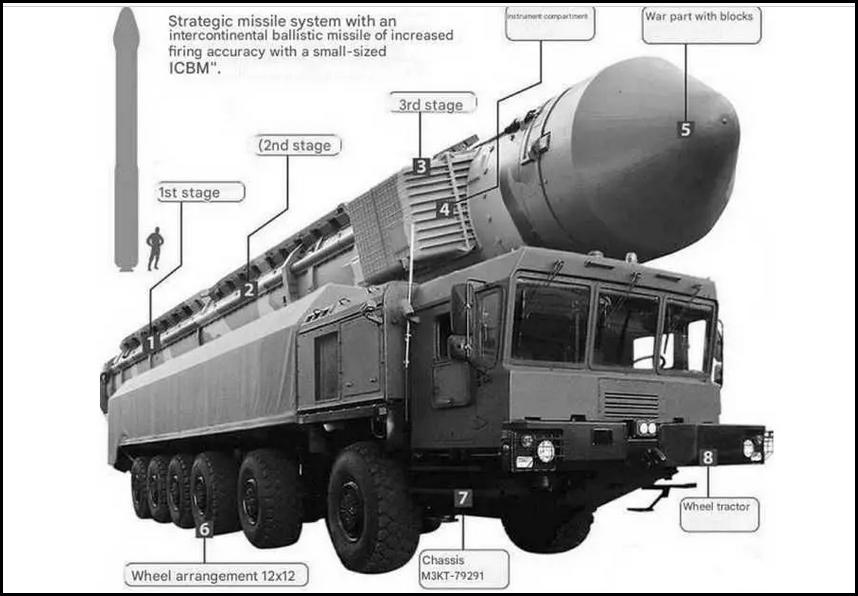
The Oreshnik is capable of carrying nuclear and conventional warheads. In this particular strike, the submunitions carried nothing. They relied on their speed of Mach 10-12 and tremendous heat. To be clear, there are two effects that affect the destructive power of the submunitions: kinetic effects and thermodynamic effects.
The submunitions are designed with a high ballistic coefficient, a configuration that prevents them from slowing in the atmosphere. Imagery of the Oreshnik submunitions compared to the Iranian IRBMs falling on Israel shows the Oreshniks falling much faster. Their speed heats the submunitions to a temperature of 4,000 °C, a temperature 75% that of the surface of the sun. Prior to Oreshnik, the hottest natural temperatures recorded on earth were the 2,370 °C generated by an ancient asteroid strike, and the c. 2,500 °C generated by thermite reactions. In fact, this writer believes thermitic material may have been weaponized and incorporated into the warheads.
Kinetic energy is the first destructive factor. Professor Postol has computed the kinetic energy of a submunition traveling at Mach 10-12 as being approximately 1.5x its equivalent weight of TNT. That makes the Oreshnik the equivalent of roughly 6 Iskander missiles.
Thermodynamic energy is the second destructive factor. Temperatures of 4,000 °C, a temperature 75% that of the surface of the sun, are unheard of in conventional munitions (higher temperatures would occur at the center of a nuclear explosion). This writer has seen no independent analysis of the thermodynamic properties of Oreshnik. In fact, the thermodynamic effects probably dominate the kinetic effects.
Consider a sabot anti-tank round that strikes its target with a penetrating rod. The kinetic energy of the rod punches through tank armor, generates tremendous heat, and causes spalling inside the crew space. The heat sets off ammunition, oil, and anything combustible.
The Oreshnik submunitions, traveling at hypersonic Mach, heated to 4,000 °C, vaporized everything in their path and penetrated to the underground production halls of the Yuzhmash factory. Everything combustible in those halls went up. Grease, oil, fuel, explosives, humans, everything.
Below is a video that shows several different views of the Oreshnik submunitions falling on the Yuzhmash factory. The first image, of the submunitions bursting through the clouds, is reminiscent of tests of the old MX Peacekeeper MIRVs from the 1980s.
Video: Rods from God: Oreshnik MIRVs Fall on Yuzhmash
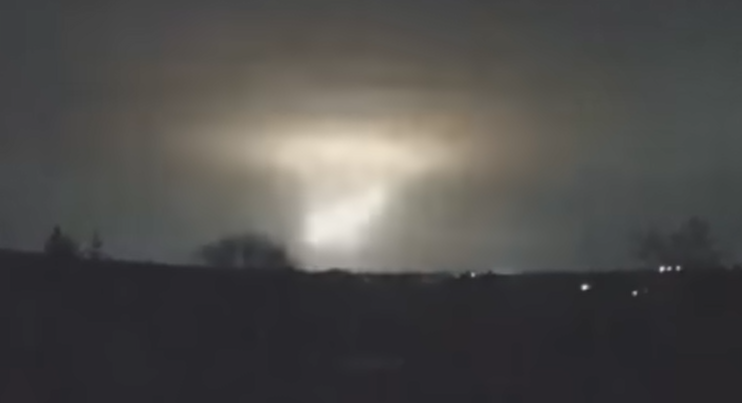
Ukraine’s President Zelensky famously said, “The missiles will speak for themselves,” when the ATACMs and Storm Shadows were fired into Russia. Following the Yuzhmash strike, Medvedev replied: Medvedev on Oreshnik.
Postol remarked on the extraordinary brightness of the plunging submunitions. This writer believes the brightness was due to thermitic activity in the composition of the warheads. This contributed to their high temperature of 4,000 °C and unusual penetrative ability. US forensic analysts are certainly combing the debris and collecting samples. They will run the samples through spectrographs to study the chemical composition of material in the warheads.
The Ukrainians have cordoned off the Yuzhmash grounds. The strike occurred at night, so unless there was a night shift working, casualties were limited. Initial reports suggest that destruction of the underground production facilities was total.
Conclusion:
Oreshnik is a game changer because Russia is now able to inflict strategic nuclear-scale damage using conventional weapons. The US and NATO are confined to a binary conventional-nuclear vector. Indeed, the US is already scrambling to revise its nuclear doctrine to account for Russia’s deployment of the Oreshnik. Good luck; that’s not how things work. Doctrine is necessarily restricted by the weapons available to carry it out.
London and Paris can be reached within 20 minutes from Kapustin Yar. Flight times are shown in Figure 5. Note, however, that in high-intensity combat, Oreshnik would not be fired from Kapustin Yar. It is road-mobile and would be fired from as far west as the Belorussian-Polish border.
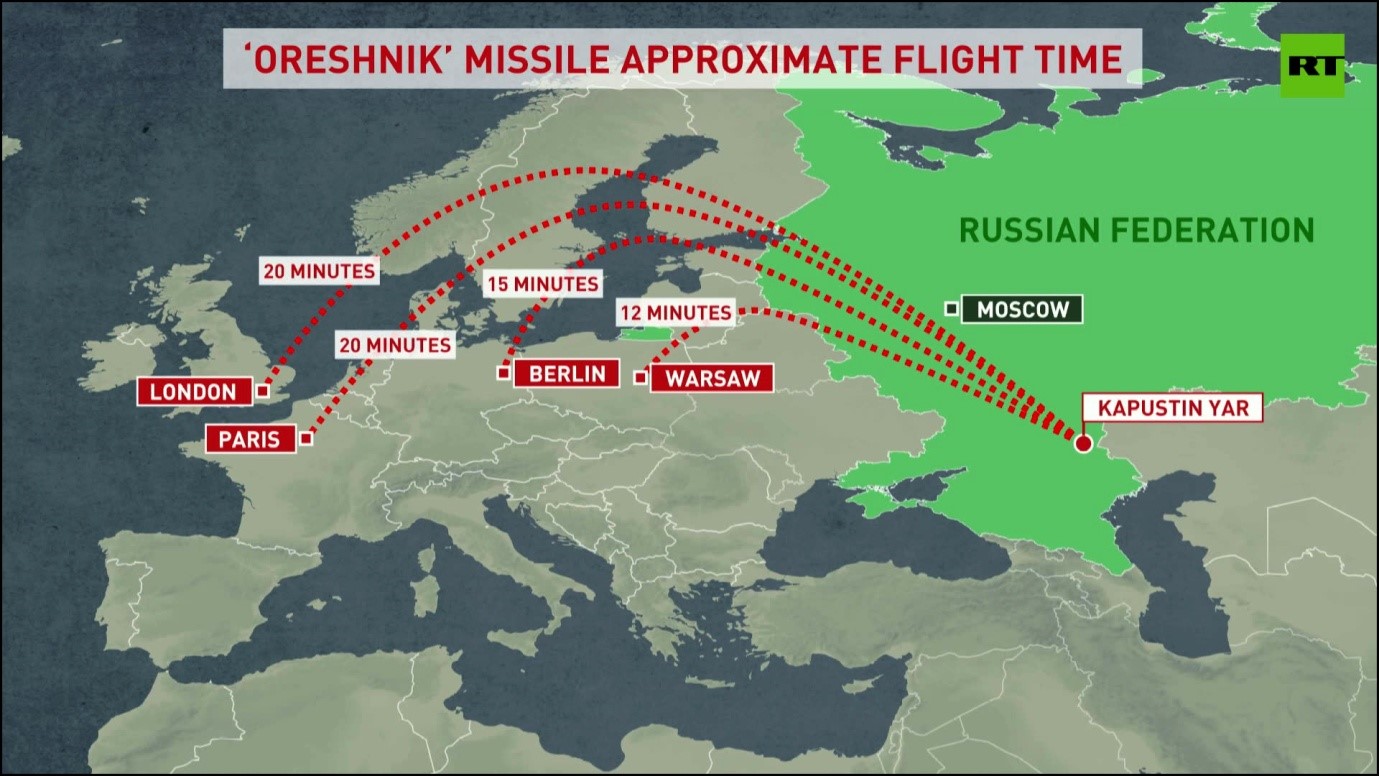
Speaking of Poland, the initial target would not be Warsaw. The first of two targets to be destroyed will be the Aegis Ashore facility in Redzikowo. Pro tip: Not a good place to be assigned. As discussed, the missile cells, ostensibly for Standard 3 ABMs, are equally able to launch Tomahawk cruise missiles, giving the US first-strike nuclear capability. It’s been a hair-up Russia’s six for years. The second target will be the US/UK/NATO staging base at Rzeszow (see Figure 6). Once a civilian airport, it has been militarized because it is the only airstrip within 50 miles of the Ukraine border long enough to support C-17 Globemaster IIIs. The place looks like Omaha Beach on D+7. Rzeszow’s two Patriot batteries have zero chance of stopping an Oreshnik attack. Fired from Belarus, there will be near-zero warning.
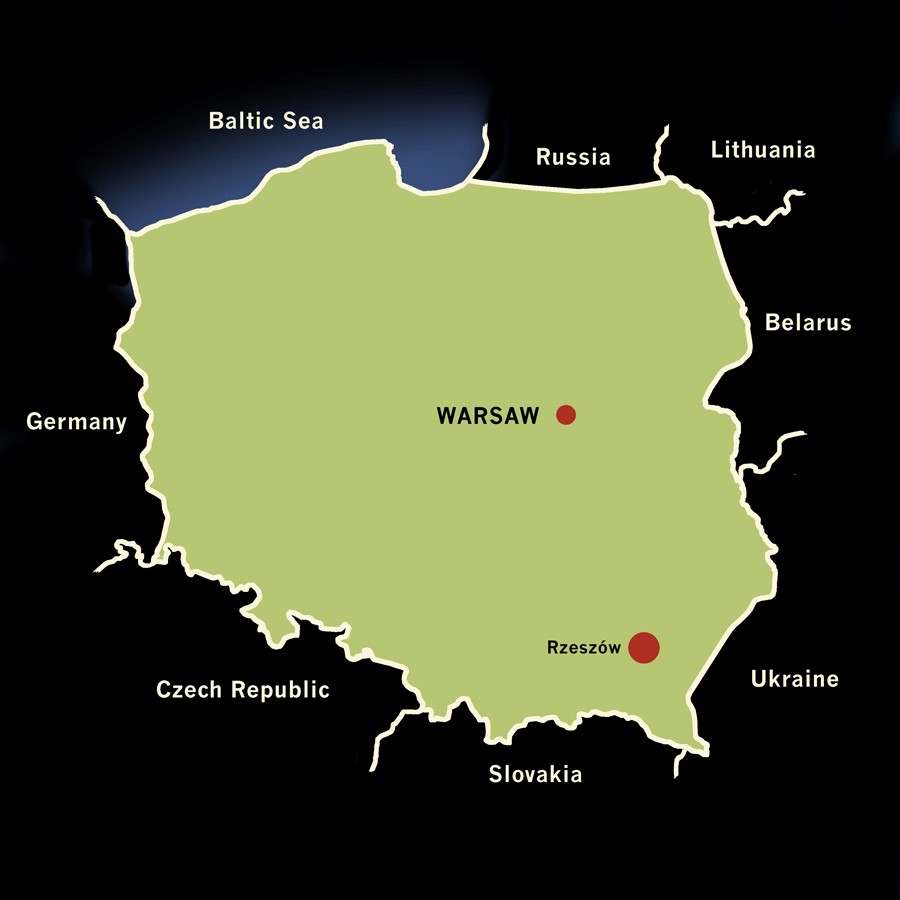
It is also worth noting that Oreshnik technology could also be applied to ICBMs of the Topol-M and Satan II type. Those could easily reach all of the continental USA. The technology could also be shared with North Korea. North Korea has had the Topol-M since February 2023. In a pinch, the Oreshnik can be deployed to Vladivostok, from which it can strike the west coast of the continental United States.
Postscript: The March to World War III
Yuzhmash was struck in response to US and UK missile strikes into Russia.
At the time of writing, US, UK, and NATO officials continued to act like Russia was bluffing. Despite the Oreshnik strike, they have continued to mount ATACM strikes into Russia. There were two in the last week.
Russia has promised a response.
About the Author

You may reach Cameron at: [email protected]
Cameron Curtis has spent thirty years in the financial markets as a trader and risk manager. He was on the trade floor when Saddam’s tanks rolled into Kuwait, when the air wars opened over Baghdad and Belgrade, and when the financial crisis swallowed the world. He’s studied military affairs and warfare all his adult life. His popular Breed series of military adventure thrillers are admired for combining deep expertise with propulsive action. The premises are realistic, the stories adrenaline-fueled and emotionally engaging.
Check out the books here: Cameron Curtis’s Amazon Page
**Editor’s Note: Searching for a holiday gift that punches above its weight? The BREED series is all the action you need! -GDM

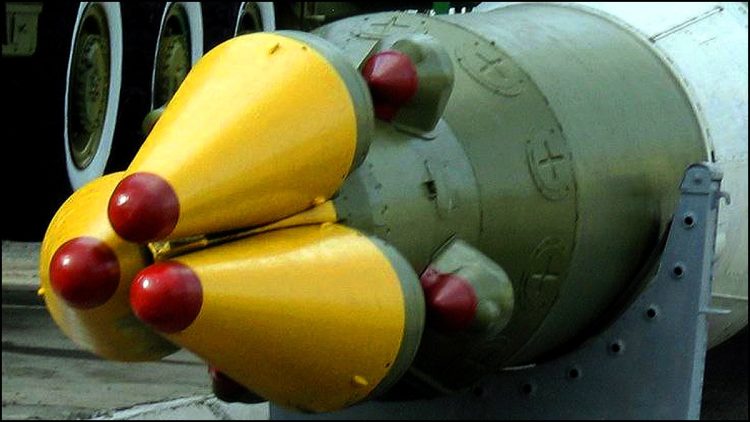









COMMENTS